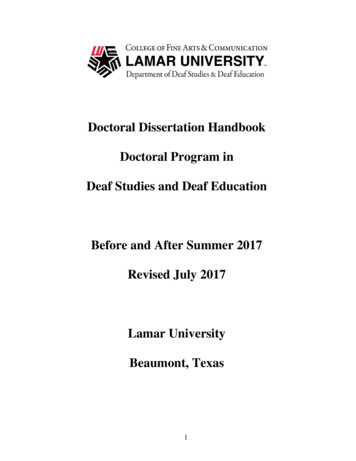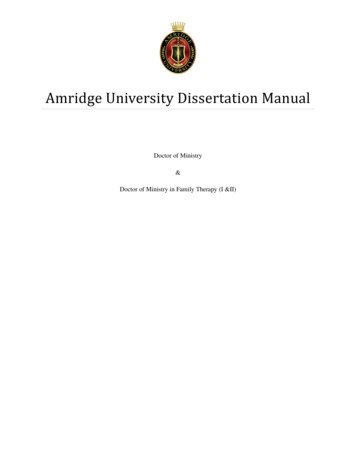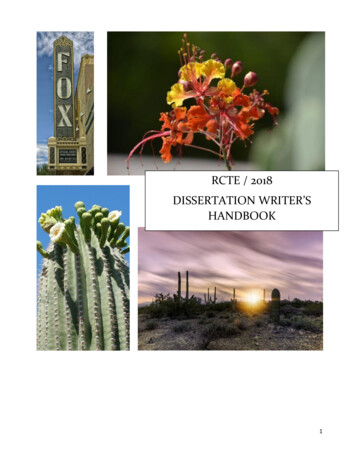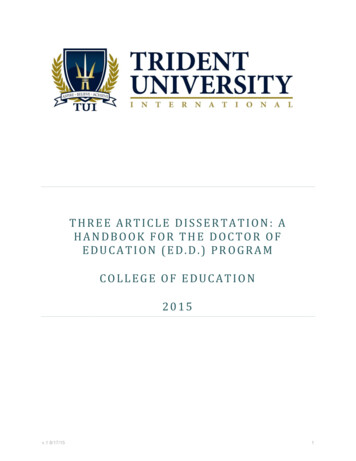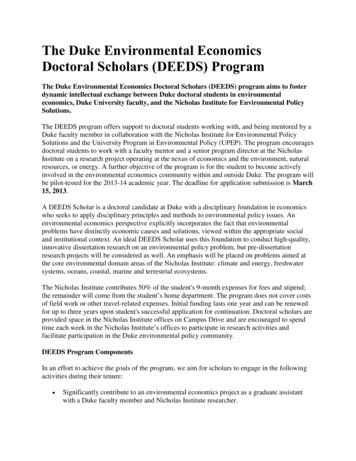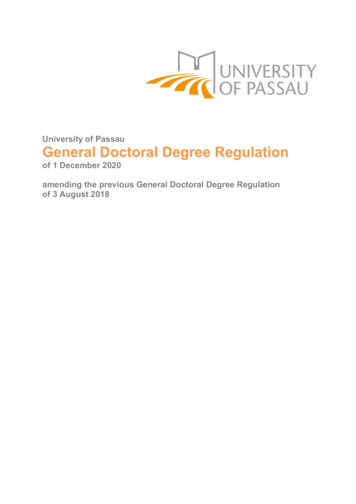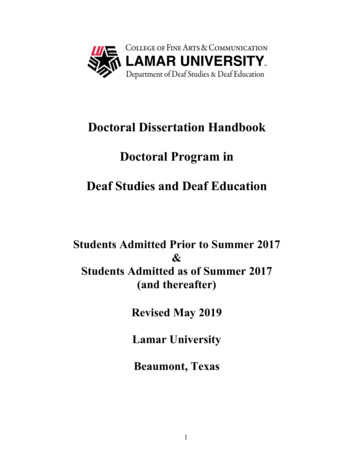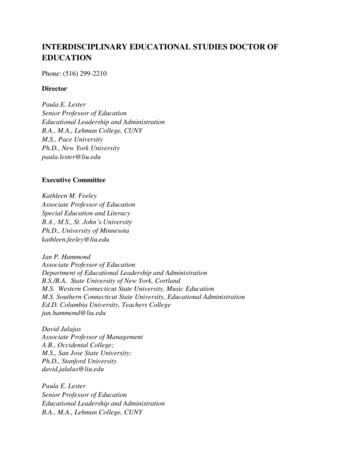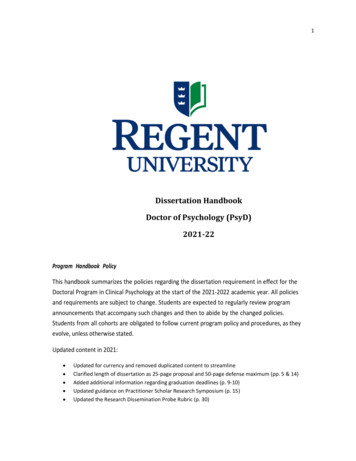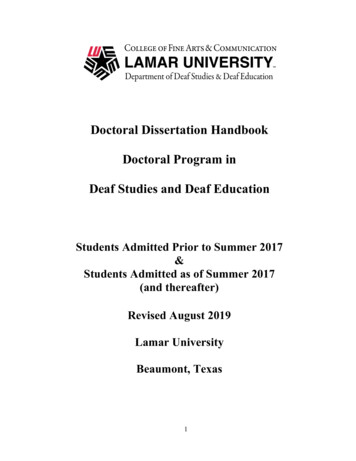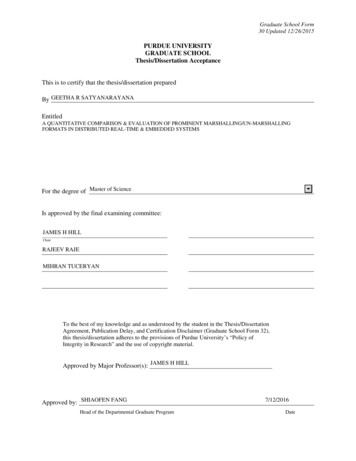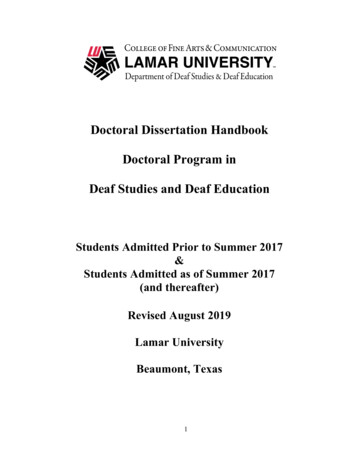
Transcription
Doctoral Dissertation HandbookDoctoral Program inDeaf Studies and Deaf EducationStudents Admitted Prior to Summer 2017&Students Admitted as of Summer 2017(and thereafter)Revised August 2019Lamar UniversityBeaumont, Texas1
Table of ContentsIntroduction .5Progress Through the Doctoral Program .5Acceptance.6Program Learning Outcomes.6Grade Policy.6Academic Honesty .7Doctoral Academic Advisor.9Preliminary Examinations .9Dissertation Committee . 10Comprehensive Examinations . 11Doctoral Candidate . 13Dissertation Proposal Defense. 13Components of the Research Proposal and Dissertation . 14Parts of a Formal Research Proposal and Dissertation Research . 14Proposal/Dissertation . 14Moving Towards Dissertation Defense . 17Preliminary Submission to Graduate Editor . 17Preparation to Defend . 18Preparation to Graduate . 18Final Oral Dissertation Defense. 18Final Submission Process . 192
1.Signature Page . 192.Thesis Book Invoice for Binding . 193.Proof of Payment of Book . 194.Personal copies are ordered separately . 205.Proof of Submission to UMI/ProQuest. 20How to Submit Your Electronic Thesis or Dissertation (ETD) Online. 21Forms . 22Preliminary Program Plan . 23Listing of Ed. D. Deaf Studies and Deaf Education Courses – Students Admitted Prior toSummer 2017 . 24Deaf Studies and Deaf Education Course Sequence – Students Admitted Prior to Summer2017 . 25Listing of Ed. D. Deaf Studies and Deaf Education Courses – Students Admitted as ofSummer 2017 (and thereafter). 26Preliminary Program Plan: DSDE Doctoral (Ed. D.) – Students Admitted . 27as of Summer 2017 (and thereafter) . 27Preliminary Program Plan: DSDE Doctoral (Ed. D.) – Students Admitted for Fall 2019Cohort . 29D-1Preliminary Examination Committee . 31Preliminary Examination Rubric . 32D-2Results of the Preliminary Examination . 33D-3ACourse of Study . 34D-3BComposition of Doctoral Committee . 36Comprehensive Examination Rubric 1: Assessment for the Doctoral ComprehensiveCandidacy Portfolio Review . 37Comprehensive Examination Rubric 2: Rubric for Evaluating Doctoral ComprehensiveCandidacy Chapter 1 of the Dissertation . 38D-7Results of Comprehensive Written and/or Oral Examination. 40D-4Approval of Dissertation Proposal . 42Approval Form for Editing Dissertation . 43D-5ASchedule for Doctoral Dissertation Oral Defense . 44D-5BResults of the Dissertation Defense . 45D-6Transfer Credit. 46D-15A Request to Change Graduate Student’s Committee. 473
4
IntroductionThe doctoral dissertation handbook, graduate catalog, and official university website provideinformation concerning policies and procedures for students in the Deaf Studies and Deaf Educationdoctoral program. The student is responsible for reading all literature on the Deaf Studies and DeafEducation program, College of Graduate Studies, College of Fine Arts and Communications, andLamar University policies and procedures.The Deaf Studies and Deaf Education program was approved by the Texas Higher EducationCoordinating Board as a 66-hour Doctor of Education (Ed. D.) degree program in 1993. The 66-hourprogram consists of 36 hours of core courses, 12 hours of cognate courses, 12 hours ofstatistics/research courses, and 6 hours of dissertation credits.Lamar University is one of only a few universities in the United States offering a doctoral degree inDeaf Studies and Deaf Education. In offering this program, Lamar University is addressing a criticalnational and international shortage of doctoral-trained educators of the Deaf and scholars in the fieldof Deaf Studies. Graduates of the doctoral program go on to assume leadership roles in schools forthe Deaf ,become teacher trainers in university settings, or scholars in the field of Deaf Studies atresearch universities .General admissions requirements can be found in the graduate catalog and on the university website.After the student has been accepted by the College of Graduate Studies, and the Department of DeafStudies and Deaf Education, the student meets with the Director of the Ed.D program (or a designatedrepresentative). The Director will assist the student and advise them for first semester courses andaddress the issue of who will be the student’s faculty Academic Advisor. The Director of DeafEducation will also provide an overview of the program and answer any questions the student has atthat time. Furthermore, the Director will continue to assist the student until an Academic Advisor isassigned. Assistance may include, but is not limited to, course selection, research topics, proceduraland policy requirements, and doctoral program requirements and deadlines. A student’s AcademicAdvisor must be a member of the Deaf Studies and Deaf Education Department faculty, must holdgraduate faculty status at Lamar University, and will be chosen during the student’s first year ofresidence. Once assigned, the Academic Advisor assists the student in deciding what courses are to betaken, what research topics should be investigated, and in some cases, what types of financial supportare available to the student.Progress Through the Doctoral ProgramProgress through the doctoral program is marked by several milestones, listed below. Students areexpected to accomplish Program Learning Outcomes throughout all stages of their doctoral studies.1.2.3.4.5.6.7.Acceptance to the programCompletion of 18 credit hoursPreliminary examinationComprehensive examinationAdvancement to candidacyDissertation stageGraduation from the program.5
AcceptanceOnce a doctoral student formally enters the program, the Director of the Department of Deaf Studiesand Deaf Education Ed.D. program registers them for classes and assigns a faculty Academic Advisorwithin the first year of residence. The Director serves as the Academic Advisor until one is assigned.Transfer CreditsTransfer credits must be submitted to the Director of the Deaf Education and Deaf StudiesDepartment and approved within the student’s first semester of study in the doctoral program. A copyof the transcript with course descriptions (if requested) must be submitted with “Form D-6: TransferCredit” to Graduate Studies office.Program Learning OutcomesDoctoral students’ progress through the doctoral program will include accomplishing four ProgramLearning Outcomes. They include:1. Apply the basic principles of inquiry and research design to educational research2. Demonstrate “T” learning; the top of the T demonstrates breadth in knowledge about DeafStudies and Deaf Education while the stem of the T demonstrates depth of knowledge in thecognate/dissertation area3. Demonstrate an ability of ASL/English bilingual fluency in academic content4. Publish peer-reviewed and translational articlesGrade Policy A doctoral student with a cumulative grade point average of 3.0 is considered to be in goodstanding. Students who fail to achieve and maintain a 3.0 cumulative grade point average at thecompletion of 9 semester hours of graduate enrollment will be expelled from the program. An earned grade of C in any given course or cognate throughout the program is not acceptable,in accordance with Lamar University’s graduate academic policy 3.16. An earned grade of Cwill cause the student to be eligible for expulsion from the program, regardless of cumulativegrade point average. In the case that a student who has received a C was allowed to continuewith conditions receives a second C, the student will be required to have a meeting with theProgram Director and Department Chair. Final grades are given at the discretion of faculty members of record for the coursesadministered. If a student substantially disagrees with the decision, they must undertake thefollowing steps: Meet, or electronically communicate with the faculty member of record to discuss thefinal grade earned. If the student feels it is unfair, they must offer evidence for thecomplaint. The faculty member will demonstrate why and how the student earned thegrade in question. If the student feels the issue has not been resolved, they must then meet with orelectronically communicate with the Ed.D. Program Director. The student shall produce6
evidence of the dispute in question and further demonstrate why they disagree with thefaculty member of record. If the student feels the issue has not been resolved with the Ed.D Program Director, theymay request a meeting with or communicate electronically with the Department Chair.The student must demonstrate evidence to the Department Chair that they have followedthe steps outlined above, and are able to offer evidence. If the student feels the issue hasnot been resolved with the Department Chair, they may request a meeting orcommunicate with the Dean. At this stage of the complaint, the Dean maintains the finaldecision, and the issue is considered closed.Academic HonestyLamar University expects all students to maintain complete honesty and integrity in their academicexperiences. Any student found guilty of dishonesty in any phase of academic work will be subject todisciplinary action.Forms of Academic Dishonesty. The University and its official representatives may initiatedisciplinary proceedings against a student accused of any form of academic dishonesty including, butnot limited to, cheating on an examination or other academic work which is to be submitted,plagiarism, collusion, and the abuse of resource materials. Cheating includes: copying, without authorization from the instructor, another student’s test paper, laboratoryreport, other report, or computer files, data listings, and/or programs; during a test, the use of materials not authorized by the person giving the test; collaborating, without authorization, with another person during an examination or inpreparing academic work; knowingly, and without authorization, using, buying, selling, stealing, transporting, soliciting, copying, or possessing, in whole or in part, the contents of test or assignmentthat has not been administered or assigned; substituting for another student, permitting any other person, or otherwise assisting anyother person to substitute for oneself or for another student in the taking of an examination ortest or the preparation of academic work to be submitted for academic credit; bribing another person to obtain a test not yet administered or information about such; andpurchasing, or otherwise acquiring and submitting as one’s own work, any research paper orother written assignment prepared by an individual or firm. (This section does not apply to thetyping of the rough and/or final versions of an assignment by a professional typist).Plagiarism shall mean the appropriation of another’s work or idea and the unacknowledgedincorporation of that work or idea into one’s own work offered for credit.Collusion shall mean the unauthorized collaboration with another person in preparing work offeredfor credit.Abuse of resource materials shall mean the mutilation, destruction, concealment, theft, or alteration ofmaterials provided to assist students in the mastery of course materials.Academic work shall mean the preparation of an essay, dissertation, thesis, report, problem,7
assignment, creative work or other projects that the student submits as a course requirement or for agrade.Procedures. Procedures for discipline due to academic dishonesty shall be the same as in otherviolations of the Student Code of Conduct (see Student Handbook), except that all academicdishonesty cases shall be considered and reviewed by the faculty member, and if necessary, theDepartment Chair, Dean, and Provost. The faculty member shall conduct a complete, thorough, andimpartial investigation of the charge of academic dishonesty and determine whether or not the studentwas responsible for the violation. If the faculty member determines that the student was responsiblefor the violation, the faculty member may assess an appropriate and reasonable sanction. The studentshall be entitled to a written notice from the faculty member of the violation, the penalty, and thestudent’s right to appeal the determination of dishonesty and/or the sanction imposed. A copy of thefaculty member’s notice to the student shall be forwarded to the Provost.If the student does not accept the decision of the faculty member concerning the determination ofdishonesty and/or the penalty imposed, the student may appeal to the faculty member’s DepartmentChair for review of the case. To do so, the student must submit, in writing, a request for an appeal tothe Chair within five working days of notification of the right to appeal. The student shall be entitledto a written notice of Chair’s decision and the student’s right to further appeal.If the student does not accept the decision of the Chair concerning the determination of dishonestyand/or the sanction imposed, the student may appeal to the Dean for review of the case. To do so, thestudent must submit, in writing, a request for an appeal to the Dean within five working days ofnotification of the Chair’s decision. Prior to rendering a decision about an appeal, the Dean mayrequest a review of the case and recommendations from the College’s Student-Faculty RelationsCommittee. The student shall be entitled to a written notice of the Dean’s decision and the right tofurther appeal.If the student does not accept the decision of the Dean, the student may then appeal to the Provost forreview of the case. To do so, the student must submit, in writing, a request for an appeal to theProvost within five working days of notification of the Dean’s decision. Before rendering a decision,the Provost shall convene an ad hoc Student-Faculty Relations Committee composed of membersfrom the standing Student-Faculty Relations Committees from the other Colleges to review the caseand offer a recommendation. The student shall be entitled to a written notice of the Provost’sdecision. The decision of the Provost shall be final.No disciplinary action against the student shall become effective until the student has receivedsubstantive and procedural due process as described above. A copy of the record pertaining to eachcase shall be forwarded to, reside in, and considered by the Office of the Vice President for StudentAffairs where it shall be treated as a disciplinary record as described in the Student Handbook. Ifadditional judicial action is necessary, as in the case of flagrant or repeated violations, the StudentAffairs Office shall initiate further action in accordance with the procedures for student discipline asdescribed in the Student Handbook.Appeals ProcessA graduate student at Lamar University has the right to appeal any judgment or decision made withinthe university. The appeal procedure depends on the nature of the decision. These are discussed in the8
Student Handbook. Questions regarding the appeals procedure should be addressed to the GraduateSchool.Doctoral Academic AdvisorDuties of Doctoral Academic Advisor. As stated above, the Director of the Deaf Studies andDeaf Education Ed.D. program assigns the doctoral student a Doctoral Academic Advisor. TheAcademic Advisor will assist the doctoral student until the student has passed the preliminaryexamination. The Academic Advisor may later be chosen as the Dissertation Committee Chair, but itis not a requirement. The Dissertation Committee Chair and the student will work closely throughoutthe dissertation stage, especially when doing research and writing the dissertation. Choosing theirDissertation Chair is one of the most important decisions that a doctoral student will make. Besidesthe research and dissertation work, the Dissertation Committee Chair may be instrumental in assistinga doctoral student with post-graduation opportunities.Program PlanA program plan should be developed in consultation with your Academic Advisor within your first twosemesters of study. The plan will guide your coursework throughout the remainder of the program, andassist in keeping you on track with all program requirements and expected Program LearningOutcomes. You are responsible to make any changes to your coursework, specify the cognate courses(course number, course title, credits), and insert your grades on the program plan for your records. Thisinformation is also needed to complete “Form D-3A: Course of Study.”Preliminary ExaminationsThe preliminary examinations are designed to assess the student’s capacity for critical analysis andsynthesized integration of knowledge acquired during the course of study for the doctoral degree inDeaf Studies and Deaf Education. Satisfactory performance in coursework does not necessarilyguarantee successful performance on the preliminary examination. A student must take theexamination after completion of 18 credits of doctoral-level course work within the program.Two forms, “Form D-0: Preliminary Program Plan” (approval of the degree plan) and “Form D3A: Course of Study,” from the Doctoral Program Director are required prior to establishing thedates for the exam. The Doctoral Program Director will create the Preliminary ExaminationCommittee and complete “Form D-1: Preliminary Examination Committee”.The preliminary examinations typically occur after the second semester of program studies or whenstudents have completed a minimum of 18 credits of doctoral-level course work. Students must workwith the Doctoral Program Director during their first semester to develop a Reading List of at least 15papers in an area of interest. At the end of the second semester or 18 hours, the Doctoral ProgramDirector will convene the committee to develop questions for each student based on their ReadingList and given a question by the Doctoral Program Director and will have two weeks to complete thewritten paper. The paper can be no more than 15 pages, which does not include the cover page andreferences (fewer pages may not be enough to effectively answer the question). It must follow APAguidelines (typed with 12-point Times New Roman font and 1-inch margins all around). Students9
may not collaborate or consult with others while taking their preliminary examination. Additionally,students are expected to follow academic honesty; failure to submit one’s own work will result indisciplinary actions.If a student fails the preliminary examination, they may be recommended for expulsion or thePreliminary Examination Committee may decide to grant an opportunity to retake the examination.Note, the examination may only be retaken one time. If granted a retake, it must be completed withinone month of the original exam. Once the student successfully completes the preliminary examinationthe Preliminary Examination Committee completes “Form D-2: Results of the PreliminaryExamination.”Reasonable accommodations will be made to allow students with disabilities to take the preliminaryexamination. The student should discuss individual needs with the Chair of the Doctoral AdvisoryCommittee to arrange accommodations as needed.Dissertation CommitteeWhile it may feel a bit early in the process to begin thinking about dissertation committees, it is anecessary step before beginning comprehensive examinations. You should choose your chair by theend of year one or in the beginning of year two. Prior to beginning the comprehensive examinationprocess, your Dissertation Committee Chair will work with you to develop your committee. YourDissertation Committee will be responsible for your Comprehensive Examination process, hence whythe selection process takes place before then.Chair Duties. The Dissertation Committee Chair is the doctoral candidate’s primary advisorduring all phases of the dissertation process. The Dissertation Committee Chair is the leader of theDissertation Committee and its liaison with the student, the program, the Department of Deaf Studiesand Deaf Education, and the Graduate School (Please note that the Dissertation Committee Chair mayor may not be the same individual as the candidate’s Doctoral Chair or Academic Advisor). TheDissertation Committee Chair convenes and conducts the proposal and dissertation defense meetings.In conjunction with other Dissertation Committee members, the Dissertation Committee Chair isresponsible for providing technical assistance and content advice. A faculty member, who has servedon at least three Dissertation Committees at any accredited college or university, is eligible to chair aDissertation Committee effective immediately after the third committee service has resulted in asuccessful defense. Exceptions may be granted by the Dean of Graduate Studies if officiallyrequested and justified by the Chair of the Department of Deaf Studies and Deaf Education. However,otherwise qualified individuals outside the Department of Deaf Studies and Deaf Education mayserve in a Dissertation Committee Co-Chair capacity if the Chair of the Department of Deaf Studiesand Deaf Education approves such an arrangement. Dissertation Committee Chairs who terminateemployment with Lamar University may continue committee service for a 12-month period followingthe termination. After that time, the individual may no longer serve as a Doctoral DissertationCommittee Chair, but may serve as a Dissertation Committee Co-Chair (with the Department of DeafStudies and Deaf Education Chair’s approval) or simply as a member of the committee.Choosing the Dissertation Committee Chair. Choosing the Dissertation Committee Chair is atwo-way process. The student may choose a Professor (i.e., faculty member) as a DissertationCommittee Chair, but the Professor must also agree to assume responsibility for the student. Doctoral10
students are encouraged to get to know faculty members, seek copies of faculty members’ curriculumvita, review faculty members’ research and publication record, and begin to establish a relationshipwith their professors. Students may choose a Professor with whom they have mutual researchinterests and with whom they feel comfortable communicating and interacting. Students can begin toget to know faculty members by taking courses with them or through scheduled appointments todiscuss mutual research interests.A chosen faculty member may decline a request to be a Dissertation Committee Chair. There aremany reasons a faculty member may decide not to work with a student. The faculty member may beadvising too many students to provide quality time with them. The faculty member may also feel thatthey would not work well with the student. In the selection of the Dissertation Committee Chair, boththe student and faculty member must realize that each party should choose each other. Students maydecide to choose a faculty member to be their Dissertation Committee Chair for a variety of reasonssuch as the faculty member’s reputation for quality teaching, scholarship, research productivity,publications, student advocacy, and interpersonal style.Once the Dissertation Committee Chair is selected, Form D-3B is developed. The DissertationCommittee Chair will assist the student in selecting other members of the Dissertation Committeethat is typically done during the semester before taking Proposal Writing, finalize the courses of study(if needed), and completing the dissertation.Working together, the student and Dissertation Committee Chair will decide on the DissertationCommittee. A Dissertation Committee consists of a minimum of five graduate faculty members,including a minimum of three Lamar University Deaf Studies and Deaf Education faculty members,and two other graduate faculty members. Two other graduate faculty members must either bemembers of the Lamar University graduate faculty or come from outside the university. They shouldbe chosen for their expertise in research design or content area. As is the case with choosing theDissertation Committee Chair, all members must agree to be on the committee.The Dissertation Committee becomes official with the submission of “Form D-3B: Composition ofDoctoral Committee Form” to the Graduate Studies office. As the Chair of the Department of DeafStudies and Deaf Education and the Dean of the Graduate School must also sign this form, these twopeople, in effect, approve the Dissertation Committee.The Dissertation Committee: approves the components of the comprehensive examinations; has the final decision regarding pass/fail of the comprehensive examinations; approves the dissertation proposal; works with the student and Dissertation Chair in advising, encouraging, and approving thedissertation research; attends the proposal presentation; approves the scheduling of the final oral examination; has the final decision regarding pass/fail of the oral dissertation defense; and has the final decision regarding the acceptance of the dissertationComprehensive ExaminationsThe Comprehensive Examination will take place once the student has completed all courses in theirprogram plan that includes a completed proposal (chapter 1, 2, 3) from Proposal Writing. The11
Dissertation Committee will be responsible for implementing and evaluating the ComprehensiveExamination process.The Deaf Stud
Progress Through the Doctoral Program Progress through the doctoral program is marked by several milestones, listed below. Students are expected to accomplish Program Learning Outcomes throughout all stages of their doctoral studies. 1. Acceptance to the program 2. Completion of 18 credit hours 3. Preliminary examination 4. Comprehensive .
